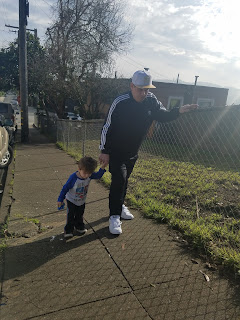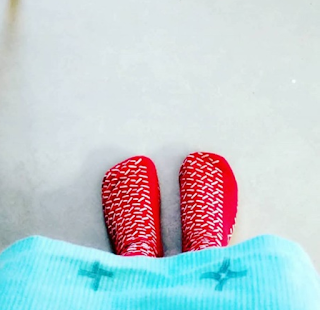Part I.
Abbreviations used in the text: GBS - Guillain-Barré Syndrome; Neuro – Univerzitetni klinični center, Nevrološka klinika Ljubljana (University Medical Centre, Ljubljana Clinic of Neurology); Soča – Univerzitetni rehabilitacijski inštitut Republike Slovenije – Soča, Ljubljana (University Rehabilitation Institute of the Republic of Slovenia – Soča, Ljubljana); EMG – Electromyography.
THE FIRST ENCOUNTER WITH GBS: It starts suddenly, like a bolt from the blue. You go to bed healthy, and wake up paralysed. Simple description of the disease would be as follows: you contract a mild bacterial or viral infection, and your body starts producing antibodies which attack not only bacteria or viruses, but also nerve fibre sheaths. The sheaths deteriorate until the treatment stops the disease. In severe cases, not only the sheaths are affected, but also nerve fibres, and it happened in Jani's case as well. During the first EMG test his leg and arm muscles showed practically no response.
Before the illness I was a mountaineer - alpinist. In the background of the picture is Triglav, the highest mountain in Slovenia. The goal is to once again stand at the top.
TREATMENT AT THE NEUROLOGICAL DIVISION: The disease comes quickly, but it takes time to deal with its consequences. And it is especially true for neurological diseases, including GBS.
The treatment started immediately upon Jani’s arrival to hospital. He was administered infusions of immunoglobulins (blood donors’ healthy antibodies). As the improvement was too slow, treatment with plasmapheresis was introduced after two weeks (patient’s blood is withdrawn, plasma removed from it, and then blood cells are returned into patient’s bloodstream). Both procedures are practically painless. The first procedure required insertion of a catheter into a vain on his arm through which medications were administered, and the second insertion of two catheters into veins of his groin to allow blood purification. Catheters were removed from his groin a couple of days after the end of the therapy. During his entire stay at the Neuro he had catheters inserted in his veins. Every few days, when the flow through catheters became obstructed, they replaced them, using veins on both arms and legs. In the beginning it was among the most painful experiences, along with almost daily blood draws. Moving was, as a rule, also very painful, e.g. at washing in the morning.
AUTOSUGGESTION, VISUALISATION, BREATHING EXERCISES: Jani was told that visualisation and autosuggestion exercises have a positive impact on recovery, and that these techniques are often used at recovery of top athletes, so he performed these also autosuggestion and visualisation exercises several times a day. They also helped him pass the time, during the day, but also during the long nights. It is best if a patient practices mind games with a topic close to him – it can be a hobby, or anything at all.
REHABILITATION AT SOČA: The first two days after admittance to Soča are dedicated to adaptation to the new environment. The doctor examines the patient, and prepares a rehabilitation programme. The second and the third day a work therapist and a physical therapist test mobility, strength, and functional capacities of the patient. The third, or the fourth day therapy sessions start. At Soča the peculiarity of the new environment is immediately noticeable: everything is oriented towards improvement of functional capacity, and activity. A bed stops being the centre of all the activity – the focus is on the wheelchair, all kinds of exercises, and daily activities. The entire staff constantly encourages patients to move, and to be as independent as possible.
THERAPIES : Physical therapy, Balance board – video games, Electro-stimulations, Hydrotherapy , Work therapy, Magnetic therapy, Psychological and social therapy, Group therapy, Therapies with doctors, therapists, nurses, technicians and other staff, Autotherapy.
REHABILITATION AT HOME: Release from a hospital system, and return home has a very positive impact on a patient. Yet the downside is that the patient is suddenly has to rely almost entirely on himself, and his family.
When realised from Soča, Jani was able to walk independently with a walker for a couple of hundred metres, so in the first month after his release from Soča he spent mostly in his wheel chair. Three months into his return home he still relied on help from his family for almost all daily tasks: undressing, dressing, preparation of food, hygiene, transport to physical therapy into the local health centre, etc.
THE SECOND PART OF REHABILITATION AT SOČA: In February 2016 he returned to Soča for three weeks and continued his rehabilitation. In his opinion the rehabilitation went by too quickly, and should last at least five times longer, or as long as necessary to enable the patient for normal life and work; Jani was positive that after the rehabilitation and another month or so of staying at home he would return to work. He had the impression that he made more progress during a week at Soča than during three weeks spent at home, and he attributed it to the professional staff, daily exercising in a pool which was unavailable at home, and special exercise equipment at Soča.
FROM MARCH TO OCTOBER 2016: After being definitely released from Soča Jani continued therapies at home. Gradually he became able to use more and more tools he had prepared. He still exercises two to four hours a day (different therapies). He dedicated a part of the morning and a part of the afternoon to therapies, mostly it depends on the weather, and when the help with exercises is available. When the daily tasks he is able to perform by himself are taken into consideration as well, the time dedicated to exercising is even longer.
He dedicated some work therapy time to amusing surfing the Net, e.g. looking for suitable fitness tools and weights. Usually he ordered a piece through internet, to be delivered to his home address, and usually he wasn't able to use the bought tool for at least a month. He bought a small 10-kg dumbbell (several disks, total weight 10 kg), but not even after twelve months he was able to use it. After 15 months he was able to perform some exercises using only the handle (approx. 2 kg) ...
Part II.
I had a harder form GBS. I'm still recovering...
My experience (Month: Activities). Start: March 2015, age - 52 years old, 2 months hospital, 4.5 months rehabilitation center.
April: Treatment. Immobility of arms and legs. Capable only of moving his right foot for 20 cm, turning and raising head, breathing, swallowing food, controlling urine and excrement. Totally dependent on help (food, dressing, hygiene..). Lying in bed.
May: Exercising with absolute help from a therapist. Movement of arms and legs in the range of a couple of centimetres (movement of feet, slight movement of arms towards body).
June: Exercising with therapists’ help, with minimal cooperation from the patient (3% arms, 10% legs). Tools: hand wheel 1st gear, stationary bike 3rd gear, pulley intermittently, suspension 25 cm of movement. Movement of arms and legs for 10 cm. Slight leaning on legs when changing position with the aid of a board, assisted by two persons. Stretching bent legs.
July: Exercising with therapists’ help, with own strength 5% in arms, 15 % legs. Tools: hand wheel 2nd gear, stationary bike 5th gear, pulley intermittently, suspension 40 cm of movement. Stood in the hydraulic standing frame for 10 min. Slightly wider movements of arms and legs, more than 10 cm. Raising feet 10 cm from the ground, in all directions. Changing positions with the aid of a board, assisted by one person, travelled home for the first time, carried inside in his wheelchair. Moving in wheelchair using legs, 50 m backwards, 10 m forwards, using arms 5 m. Made some steps aided by the physical therapist, and a walker.
August: Exercising with therapists’ help, with his own strength 8% arms, 25% legs. Tools: hand wheel 3rd gear, stationary bike 9th gear, pulley 2 kg, using both arms, suspension 60 cm of movement, exercises in Hubbard’s tank. When leaning elbow on a table he was able to scratch his nose, hold a straw, put food in his mouth. Stepped down from a higher therapy table, stood in a walker. Changed positions by himself. Pushed wheelchair using legs, 100 m backwards, 25 m forwards, using arms 20 m. Walked aided by the physical therapist, and a walker.
September: Exercising with therapists’ help, with his own strength 10% arms, 30 % legs. Tools: hand wheel 4th gear, stationary bike 13th gear, pulley 3 kg, using both arms, walked 100 m with crutches (walker). Walked in a pool, swam backstroke 100 m. Practiced climbing steps in a pool. Clenched fist, 5% of the movement. Ate and drank slowly by himself. Washed his hands. Read a book. Wiped his nose without leaning elbow. Got up from the wheelchair, changed positions while standing. Turned by himself on his side in bed.
October 2015: Exercised independently, with his own strength 12% arms, 30% legs. Tools: hand wheel 4th gear, stationary bike 16th gear, pulley 4 kg, using both arms, walked while pushing a walker with a saddle (with frequent rests). Swam backstroke 200 m, forward 30 m. Walked up and down 8 steps. Ate all meals by himself and drank (except preparing the meal and cutting to pieces), washed his teeth. Used the toilet. By the end of the month start using computer keyboard with accessories.
March 2016: Able to unzip a light zipper and buttons. Took off a baggy sweater (over head) or coat, took off his socks, dressed and undressed sweatsuit. Took off shoes with laces. Put on shoes with Velcro. Drank using one hand. Strength in arms 15%, in legs 40%. Clenching fist - 10-20% of the movement. Exercised strength with 0.5 kg weight. Longer distances with a walker. Trained driving car on a distance of few kilometres. Started typing without accessories.
August 2016: Walked kilometre or more with a walker, over hundred metres using hiking poles. Exercised on a combined fitness tool, starting weight. Strength in arms 18%, in legs 45%. Clenching fist - 30% of the movement. Exercised for strength using 2 kg. drove a car for 10 km.
November 2016: Walked a kilometre with hiking poles. Short walk on unlevel terrain. Partial movement of the hand upwards in wrist. Strenght in arms 20%, in legs 50%. Exercised for strength using 3 kg weight, exercised on a combined fitness tool, second gear. Clenching fist - 40% of the movement. Drove a car for more than 10 km.
From the books: Janez Mate, MY ENCOUNTER WITH THE GUILLAIN-BARRÉ SYNDROME and THE FACES of Guillain-Barré SYNDROME, Knjižnica Miklova hiša, Ribnica 2017
More information yuo can see: http://www.miklovahisa.si/
MY ENCOUNTER WITH GUILLAIN-BARRÉ SYNDROME
Look inside: https://issuu.com/knjiznica.miklovahisa/docs/my_encounter_with_the_gb_syndrome
FACES of Guillain-Barré SYNDROME
Look inside: https://issuu.com/knjiznica.miklovahisa/docs/gbs_obrazi_eng.














































